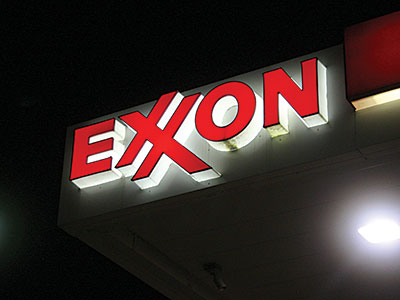Time to Cancel Exxon’s Government Contracts.

 On July 21, President Obama issued a landmark executive order protecting LGBT workers from job discrimination.
On July 21, President Obama issued a landmark executive order protecting LGBT workers from job discrimination.
The order prohibits discrimination based on gender identity in federal employment by amending an existing order banning sexual orientation discrimination within the federal workforce. It also prohibits the federal government from contracting with companies that discriminate against their employees on the basis of sexual orientation or gender identity by amending an order prohibiting discrimination based on race, color, religion, sex, or national origin.
What better place is there to start enforcing the executive order than with Exxon Mobil, the worst-rated company in the history of the Human Rights Campaign’s Corporate Equality Index? Until Exxon finally implements employment nondiscrimination protections for its LGBT employees and works to create an equal-opportunity environment, the federal government should cancel Exxon’s $424 million in 2014 primary contracts (as of August 7) and refuse to sign new ones. Exxon is also a subcontractor on additional contracts, but these dollar amounts are not publicly available. These, too, should be canceled and no new ones signed.
Exxon has received over $6.6 billion in federal (prime) contracts since 2005, largely for fuel for the U.S. Department of Defense. Yet even among oil and gas companies — one of the least gay-friendly industries in the nation, according to HRC — Exxon is a standout. It is the only major oil company on the Corporate Equality Index to deny protections for both sexual orientation and gender identity to its employees (though Marathon and Valero provide only the former).
The cover of The Advocate’s “Best Companies” issue one year ago exposed “Exxon’s Gay Shame.” In the article, I explored Exxon’s legacy as one of the most antigay corporations in the nation and answered the question “What’s wrong with Exxon?”
In 2012, 2013, and 2014, Exxon received a -25 out of 100 possible points in HRC’s annual Corporate Equality Index. It is the lowest score ever received by any corporation, and no other company has received a negative score. Exxon fails to meet a single one of HRC’s criteria for an LGBT-inclusive workplace, and for 16 years — most recently in May 2014 — it has worked against annual shareholder resolutions calling for such inclusion. Exxon even erased nondiscriminatory and partner benefit policies in place at companies it purchased: Mobil Oil Corporation in 1999, and XTO Energy in 2010. It is also under investigation by the Illinois Department of Human Rights for discriminating in its hiring practices on the basis of sexual orientation.
After “Exxon’s Gay Shame” went to print, Exxon announced that beginning October 1, 2013, it would recognize legally married same-sex couples when determining eligibility for benefit plans for its 77,000 employees and retirees in the U.S. Exxon was adopting new federal tax rules introduced following the Supreme Court’s DOMA decision in June 2013.
Exxon’s policy, however, is not applied company-wide and therefore fails to satisfy the Corporate Equality Index’s benefit requirements. The policy applies only to employees married in states that have legalized same-sex marriage. The vast majority of Exxon’s U.S. employees live in Texas, a state without legalized same-sex marriage. Exxon would not provide information on how many same-sex spouses or family members have received benefits.

Getty Images
Exxon contends that it already protects its LGBT employees, explaining in a widely circulated statement which spokesman Alan Jeffers emailed to me: “Exxon Mobil’s global policies prohibit all forms of discrimination in any company workplace, anywhere in the world. This includes discrimination based on sexual orientation or gender identity.”
HRC calls this statement “a lie” and “a master class in doublespeak.” It is not drawn from Exxon’s Equal Employment Opportunity (EEO) policy, which enumerates every protected category, including age, race, sex, and religion, but does not include sexual orientation or gender identity and therefore does not provide equivalent legal protection. “Having a nondiscrimination policy is very black-and- white,” says HRC workplace project director Deena Fidas. “Exxon does not have one.”
The good news: Jeffers says that Exxon will comply with the president’s executive order and any applicable Department of Labor regulations. Jeffers also agreed with me that these regulations — which the DOL has 90 days from the date of the order to prepare — will likely require that companies enumerate sexual orientation and gender identity protections directly in their EEO.
But Fidas met these assurances with skepticism. “Exxon has a spotty record when it comes to honest representations of their polices, and until we see the actual nondiscrimination statement at Exxon change, we cannot know for sure that they are in fact intent on following the executive order.”
Exxon will also likely need to do more than just change the words of its EEO. The existing executive order requires contractors to “take affirmative action to insure that equal opportunity is provided in all aspects of their employment.” The new regulations, therefore, will also likely require that companies go beyond the EEO to take proactive steps to ensure an LGBT- inclusive workplace, such as employee education, training, outreach, and recruitment and retention plans for LGBT employees.
Neither the White House nor the Department of Labor, whose Office of Federal Contract Compliance Programs enforces the order, would comment on what approach would now be taken toward Exxon.
What is clear is that once the new regulations are issued, Exxon Mobil must make significant changes to its LGBT policies and practices. If it fails to do so, canceling its contracts is the perfect place to begin turning the president’s landmark words on paper into a real-world means of historic change.
